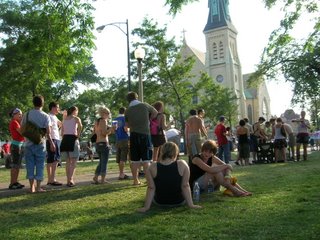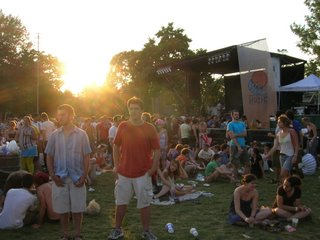The bands I saw/heard at Pitchfork Fest Day 2 were:
CSS (Cansei de Ser Sexy)
Aesop Rock w/ Mr Lif
Mission of Burma
Devendra Banhart
Yo La Tengo
Matthew Dear
Spoon
Because of the exhaustive nature of Day 1, I decided to go to Union Park a bit later on Sunday. It’s too bad that I missed Tapes ‘N Tapes and Danielson. I wanted to evaluate them based on the buildup Pitchfork created. I’m kind of glad I missed Jens Lekman though. I just don’t understand what the indie writers see in his music (maybe he’ll be my next Anti-Hipster project). I arrived around 3 pm, and made my way straight to the Biz 3 stage (where I had spent very little time on Saturday) at the rear of Union Park. I had heard a little about CSS (short for Cansei de Ser Sexy) from internet news sources. I won’t tell you what their name means (just read any review of their album), but I will say that they’re an electro dance rock group from Brazil. I came into this set with a very skeptical mind, since I hadn’t heard their music and I tend to expect most bands with hype to be letdowns. At first approach, the scene resembled the opening act of zombie movie “Shawn of the Dead.” Or maybe even Robert Palmer’s “Addicted to Love” music video. Anyone who can make twenty-something Caucasian males dance and groove like South American strippers must be employing some new tricks. So CSS doesn’t consistently amaze, but they do have the ability to make a party in full daylight with little to no intoxication involved. I enjoyed the female vocals, and the explicit song titles up the fun level. After all, they don’t seem to take themselves too seriously, even though they’ve been signed to Sub Pop (a label on the opposite side of the world of where the band was formed). Fans of the Sounds or older Yeah Yeah Yeahs would benefit from looking into this group.

Moving on, the first main stage act that I paid attention to on Sunday was Aesop Rock with Mr. Lif. As far as hip hop goes, I can only appreciate music that displays creativity and a willingness to push beyond the mainstream sounds of the past 20 years. It seems as though Aesop Rock fits the bill. He’s not trying to sell an image or a lifestyle. He’s just a guy from New York (I think?) with smooth lyrics about life that match ideally with his undemanding beats. His wordplay will really have your head spinning at times, but it’s impressive to say the least. If you’re into any alternative hip hop (like Jurassic 5, the Roots, or even older stuff like A Tribe Called Quest), I’d recommend you pick up the album Labor Days.
The rest of Sunday was difficult. I was basically passing the time until Yo La Tengo took the stage. I watched a little of Mission of Burma’s set, mostly because I wanted to see the band who reportedly started the post-punk genre (and they’re on my 80’s underground box set). For a threesome who are probably in their 50’s, they do rock in a big way. It was interesting to imagine the hundreds of bands who have followed in Mission’s footsteps since their debut album was released in 1982. I don’t think their recent couple CD’s are something I’d really get into (not like Sonic Youth’s new one), so halfway through their set I went to rest in the shade and conserve water (remember, it was another 95 degree and sunny day). (note - picture below is the water filling station at the festival)

After Mission came Devendra Banhart, who I had been waiting to see for some time because I expected that the pedestal he has been placed on would dissolve easily after his unfulfilling performance. Banhart is usually tagged as “freak folk,” but all I know about him is that he was born in Columbia and writes generally unengaging music. His set came with extensive breaks between songs and a whole lot of boredom. His band looks like they were dug out of some northern California cave after decades of recluse, all complete with dirty beards and flower-child clothing. But the bottom line is, this is not psychedelic rock, or even melodic folk rock. It’s some kind of minimalist experimental acoustic-based songwriting that, I believe, 99% of people who aren’t struggling indie music critics won’t connect with.

Finally! Next was Yo La Tengo! The band who I’ve been obsessed with for the past three years since I first discovered them through my own hard work. But oh, what a let down I was in for. I won’t blame it on the band. I blame it on the festival set up. First of all, their stage speakers were QUIET. Next, techno performer Matthew Dear was on the Biz 3 stage behind them, so the bass bled through their sound in a bad way. Third, the other main stage was doing sound check for Spoon and interfered with their sound. The end result was extremely frustrating and I don’t even think I can attempt to talk about the band or their abilities and accomplishments, because I don’t feel that I got a real concert experience. So I will put off talking about them until I (hopefully) see them in October, when they are scheduled to play at indoor venues around the country.
After giving up on Yo La Tengo, I went to the Biz 3 stage to watch Detroit artist Matthew Dear. I heard that he’s a prominent figure in the electronic music scene there, and his set was very entertaining. When I walked up, he was mixing old disco and hip hop with fresh beats. It was basically a dance party in that big white tent. I was thinking that, at a techno concert, the crowd is really the show instead of the artist. The crowd becomes the entertainment, or the physical manifestation of the music. I hope I get to explore that idea more when I move back to Michigan.
Spoon was the last band that I saw at the Pitchfork Music Festival. They are not a very inspiring band, so I don’t have a lot to say about them. They do strike me as the carriers of a torch once held by piano man Billy Joel. They play relatively to-the-point indie rock, with repetitive piano or guitar arrangements. The vocals have a cold city sound, ideal for Chicagoans ears, but without being unpleasant. I am a fan of their song “The Way We Get By,” which played on an episode of O.C. (when I was completely and embarrassingly obsessed with that program). After Spoon came the Brazil group Os Mutantes, who I expected to be world music giants playing psychedelic rock with a Latin flair. They were not altogether appealing though, so I decided to head home after what felt like a long weekend of music. I had no idea, though, what was in store for me at Lollapalooza. I will do my best to convey my experience of the weekend of Aug 4 – 6, 2006 to you over the next week or two. In closing, the most important thing I learned from attending the Pitchfork Music Festival is that you can draw 36,000 people to a line-up of bands largely on hype you generate on your own website, instead of the accomplishments of the bands themselves. So that’s what it comes down to. The festival was made by hipsters for hipsters. There were a couple good performances here and there, but overall it was a let down. That’s the truth according to me. Disagree if you will.




No comments:
Post a Comment